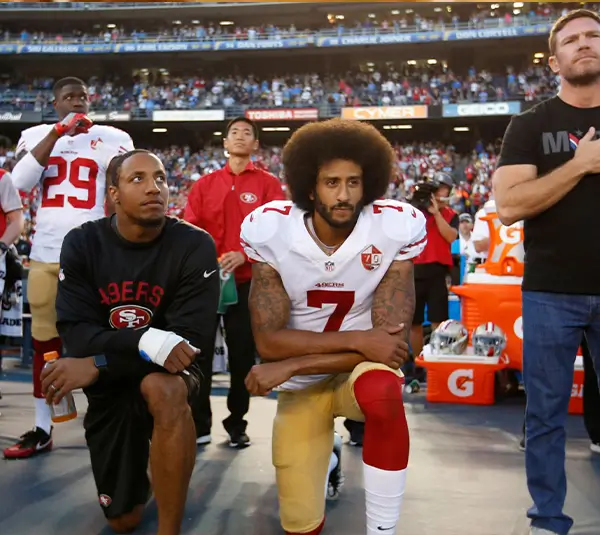Sports at the Crossroads—The Intersection of Politics and Social Issues
- Abeera Marium Siddiqui
- February 29, 2024
- 8:54 am

Throughout history, sports have often transcended their role as mere entertainment, becoming a powerful platform for addressing and influencing social and political issues. From racial equality to human rights, sports have served as a stage for athletes and organizations to voice their concerns, challenge the status quo, and drive meaningful change. This blog explores the intricate and often controversial relationship between sports, politics, and social issues, delving into the complex dynamics that arise when these spheres intersect.
The Power of Sports as a Catalyst for Change
Sports possess a unique ability to capture the attention and imagination of millions, granting athletes and organizations a powerful platform to amplify their voices and advocate for causes that resonate beyond the playing field. Through their actions and words, iconic figures from Jesse Owens to Muhammad Ali have used their sporting prowess to champion social justice, challenge oppressive regimes, and inspire generations to confront injustice.

Activism and Protest in Sports
As the influence of sports has grown, so too has their role in facilitating activism and protest. From the iconic raised fists of Tommie Smith and John Carlos at the 1968 Olympics to Colin Kaepernick's kneeling during the national anthem, athletes have used their platforms to bring attention to issues of racial inequality, police brutality, and human rights violations. Such acts of protest have often sparked heated debates, polarizing public opinion and highlighting the delicate balance between individual expression and collective responsibility.
The Intersection of Sports and Politics
The relationship between sports and politics is complex and multifaceted. Governments and political leaders have long recognized the power of sports to foster national pride, promote ideologies, and project soft power on the global stage. Sporting events have been used as diplomatic tools, with boycotts, sanctions, and hosting rights often becoming pawns in geopolitical struggles. Moreover, the governance of sports organizations, the allocation of resources, and the pursuit of lucrative hosting opportunities have all become intertwined with political agendas and interests.
Ethical Dilemmas and Controversies
The intersection of sports, politics, and social issues has also given rise to numerous ethical dilemmas and controversies. Should athletes be compelled to travel to countries with poor human rights records? Should sporting bodies boycott nations that engage in oppressive practices? How should the industry respond to allegations of corruption, doping, or human rights violations within its ranks? These questions challenge the moral compass of sports organizations, athletes, and fans alike, forcing them to navigate complex ethical terrain and weigh the consequences of their actions.

The Role of Corporate Sponsorships and Media
Corporate sponsorships and media partnerships have become integral to the financial sustainability of the sports industry, but their influence extends beyond mere economic considerations. Sponsors and media entities can wield significant power in shaping narratives, influencing public discourse, and even dictating the behavior of sports organizations and athletes. The pursuit of lucrative deals and media exposure can create tensions between commercial interests and social responsibility, raising questions about the boundaries of corporate influence in the realm of sports.
Balancing Values and Integrity
As sports continue to navigate the complex terrain of politics and social issues, maintaining a balance between values and integrity has become paramount. Sports organizations, athletes, and fans must grapple with the ethical implications of their actions, weighing the potential impact on human rights, social justice, and global unity. By fostering a culture of accountability, transparency, and principled decision-making, the sports industry can harness its immense influence to promote positive change while upholding the integrity of the games themselves.
Conclusion
The intersection of sports, politics, and social issues is a dynamic and often contentious arena. As athletes and organizations wield their platform to address pressing global issues, they must navigate a delicate balance between individual expression, collective responsibility, and the integrity of the games themselves. By embracing their role as agents of change while maintaining ethical standards and a commitment to unity, the sports industry can continue to inspire and influence generations, transcending boundaries and driving meaningful progress in the pursuit of a more just and equitable world.
CATEGORIES


Your go-to destination for diverse and engaging content!
Explore a world of knowledge, entertainment, and connection right at your fingertips.
POPULAR POSTS





